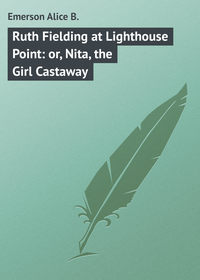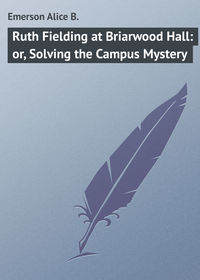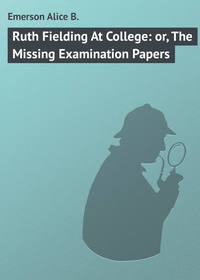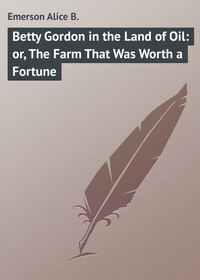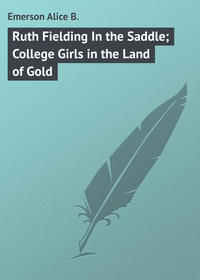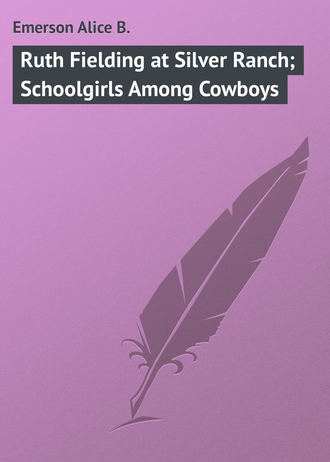 полная версия
полная версияRuth Fielding at Silver Ranch; Schoolgirls Among Cowboys
“Uncle Jabez is in great trouble, sure,” Ruth said. “Losing money – and a whole lot of money, too, as he has – is a serious matter. Uncle Jabez could lose lots of things better than he can money, for he loves money so!”
“My gracious, Ruth,” exclaimed Helen, with a sniff, “you’d find an excuse for a dog’s running mad, I do believe! You are bound to see the best side of anybody.”
“What you say isn’t very clear,” laughed her chum, good-humoredly; “but I guess I know what you mean, and thank you for the compliment. I only hope that uncle’s investment in the Tintacker Mine will come out all right in the end.”
Mary Cox, “The Fox,” sat next to Ruth, and at this she turned to listen to the chums. Her sharp eyes sparkled and her face suddenly grew pale, as Ruth went on:
“I expect Uncle Jabez allowed me to come out here partly because that mine he invested in is supposed to be somewhere in this district.”
“Oh!” said Helen. “A real mine?”
“That is what is puzzling Uncle Jabez, as I understand it,” said Ruth soberly. “He isn’t sure whether it is a real mine, or not. You see, he is very close mouthed, as well as close in money matters. He never said much to me about it. But old Aunt Alvirah told me all she knew.
“You see, that young man came to the mill as an agent for a vacuum cleaner, and he talked Uncle Jabez into buying one for Aunt Alvirah. Now, you must know he was pretty smart to talk money right out of Uncle’s pocket for any such thing as that,” and Ruth laughed; but she became grave in a moment, and continued:
“Not that he isn’t as kind as he knows how to be to Aunt Alvirah; but the fact that the young man made his sale so quickly gave Uncle Jabez a very good opinion of his ability. So they got to talking, and the young man told uncle about the Tintacker Mine.”
“Gold or silver?” asked Helen.
“Silver. The young fellow was very enthusiastic. He knew something about mines, and he had been out here to see this one. It had been the only legacy, so he said, that his father had left his family. He was the oldest, and the only boy, and his mother and the girls depended upon him. Their circumstances were cramped, and if he could not work this Tintacker Mine he did not know how he should support the family. There was money needed to develop the mine and – I am not sure – but I believe there was some other man had a share in it and must be bought out. At least, uncle furnished a large sum of money.”
“And then?” demanded Helen Cameron.
“Why, then the young man came out this way. Aunt Alvirah said that Uncle Jabez got one letter from Denver and another from a place called Butte, Montana. Then nothing more came. Uncle’s letters have been unanswered. That’s ever since some time last winter. You see, uncle hates to spend more money, I suppose. He maybe doesn’t know how to have the mine searched for. But he told me that the young man said something about going to Bullhide, and I am going to try to find out if anybody knows anything about the Tintacker Mine the first time we drive over to town.”
All this time Mary Cox had been deeply interested in what Ruth said. It was not often that The Fox paid much attention to Ruth Fielding, for she held a grudge against the girl of the Red Mill, and had, on several occasions, been very mean to Ruth. On the other hand, Ruth had twice aided in saving The Fox from drowning, and had the latter not been a very mean-spirited girl she would have been grateful to Ruth.
About the time that Ruth had completed her story of the Tintacker Mine and the utter disappearance of the young man who had interested her Uncle Jabez in that mysterious silver horde, Jane Ann called them all to supper. A long, low-ceiled, cool apartment was the dining-room at Silver Ranch. Through a long gallery the Mexican woman shuffled in with the hot viands from the kitchen. Two little dark-skinned boys helped her; they were Maria’s children.
At supper Mr. Hicks took the head of the long table and Jane Ann did the honors at the other end. There were the Cameron twins, and Madge and Bob, and Jennie Stone and Mary Cox, beside Ruth Fielding herself. It was a merry party and they sat long over the meal; before they arose from the table, indeed, much shuffling and low voices and laughter, together with tobacco smoke, announced the presence of some of the cowboys outside.
“The boys is up yere to hear that pinanner,” said Mr. Hicks. “Jib’s got it ready to slip out o’ the box and we’ll lift it into the other room – there’s enough of us huskies to do it – and then you young folks can start something.”
Jane Ann was delighted with the handsome upright instrument. She had picked it out herself in New York, and it had been shipped clear across the continent ahead of the private car that had brought the party to Bullhide. The jarring it had undergone had not improved its tone; but Helen sat down to it and played a pretty little medley that pleased the boys at the windows.
“Now, let Ruth sing,” urged Jane Ann. “The boys like singing; give ’em something they can join in on the chorus like – that’ll tickle ’em into fits!”
So Ruth sang such familiar songs as she could remember. And then Helen got her violin and Madge took her place at the piano, and they played for Ruth some of the more difficult pieces that the latter had learned at Briarwood – for Ruth Fielding possessed a very sweet and strong voice and had “made the Glee Club” during the first half of her attendance at Briarwood Hall.
The boys applauded from the veranda. There was at least a dozen of the ranchman’s employes at the home corral just then. Altogether Mr. Hicks paid wages to about sixty punchers and horse wranglers. They were coming and going between the home ranch and the ranges all the time.
The girls from the East gave the Silver Ranch cowboys a nice little concert, and then Jane Ann urged Jib Pottoway to come to the piano. The half-breed was on the veranda in the dusk, with the other fellows, but he needed urging.
“Here, you Jibbeway!” exclaimed Mr. Hicks. “You hike yourself in yere and tickle these ivories a whole lot. These young ladies ain’t snakes; an’ they won’t bite ye.”
The backward puncher was urged on by his mates, too, and finally he came in, stepping through the long window and sliding onto the piano bench that had been deserted by Madge. He was a tall, straight, big-boned young man, with dark, keen face, and the moment Tom Cameron saw him he seized Bob by the shoulder and whispered eagerly:
“I know that fellow! He played fullback with Carlisle when they met Cornell three years ago. Why, he’s an educated man – he must be! And punching cattle out on this ranch!”
“Guess you forget that Theodore Roosevelt punched cattle for a while,” chuckled Bob. “Listen to that fellow play, will you?”
And the Indian could – as Mr. Hicks remarked – “tickle the ivories.” He played by ear, but he played well. Most of the tunes he knew were popular ditties and by and by he warmed the punchers up so that they began to hum their favorite melodies as Jib played them.
“Come on, there, Ike!” said the Indian, suddenly. “Give us that ‘Prayer’ you’re so fond of. Come on, now, Ike!”
Bashful Ike evidently balked a little, but Jib played the accompaniment and the melody through, and finally the foreman of Silver Ranch broke in with a baritone roar and gave them “The Cowboy’s Prayer.” Ike possessed a mellow voice and the boys hummed in chorus in the dusk, and it all sounded fine until suddenly Jib Pottoway broke off with a sudden discordant crash on the piano keys.
“Hel-lo!” exclaimed Bill Hicks, who had lain back in his wicker lounging chair, with his big feet in wool socks on another chair, enjoying all the music. “What’s happened the pinanner, Jib? You busted it? By jings! that cost me six hundred dollars at the Bullhide station.”
But then his voice fell and there was silence both in the room and on the veranda. The sound of galloping hoofs had shut the ranchman up. A pony was approaching on a dead run, and the next moment a long, loud “Ye-ow! ye-ow!” announced the rider’s excitement as something extraordinary.
“Who’s that, Ike?” cried Hicks, leaping from his chair.
“Scrub Weston,” said the foreman as he clumped down the veranda steps.
Jib slipped through the window. Hicks followed him on the jump, and Jane Ann led the exodus of the visitors. There was plainly something of an exciting nature at hand. A pony flashed out of the darkness and slid to a perilous halt right at the steps.
“Hi, Boss!” yelled the cowboy who bestrode the pony. “Fire’s sweeping up from Tintacker way! I bet it’s that Bughouse Johnny the boys have chased two or three times. He’s plumb loco, that feller is – oughtn’t to be left at large. The whole chapparel down that a-way is blazin’ and, if the wind rises, more’n ha’f of your grazin’ll be swept away.”
CHAPTER IV – THE FIRE FIGHT
The guests had followed Mr. Hicks and Jib out of the long window and had heard the cow puncher’s declaration. There was no light in the sky as far as the girls could see – no light of a fire, at least – but there seemed to be a tang of smoke; perhaps the smoke clung to the sweating horse and its rider.
“You got it straight, Scrub Weston?” demanded Bill Hicks. “This ain’t no burn you’re givin’ us?”
“Great piping Peter!” yelled the cowboy on the trembling pony, “it’ll be a burn all right if you fellows don’t git busy. I left Number Three outfit fighting the fire the best they knew; we’ve had to let the cattle drift. I tell ye, Boss, there’s more trouble brewin’ than you kin shake a stick at.”
“‘Nuff said!” roared Hicks. “Get busy, Ike. You fellers saddle and light out with Scrub. Rope you another hawse out o’ the corral, Scrub; you’ve blamed near killed that one.”
“Oh! is it really a prairie fire?” asked Ruth, of Jane Ann. “Can’t we see it?”
“You bet we will,” declared the ranchman’s niece. “Leave it to me. I’ll get the horse-wrangler to hitch up a pair of ponies and we’ll go over there. Wish you girls could ride.”
“Helen rides,” said Ruth, quickly.
“But not our kind of horses, I reckon,” returned Jane Ann, as she started after the cowboys. “But Tom and Bob can have mounts. Come on, boys!”
“We’ll get into trouble, like enough, if we go to this fire,” objected Madge Steele.
“Come on!” said Heavy. “Don’t let’s show the white feather. These folks will think we haven’t any pluck at all. Eastern girls can be just as courageous as Western girls, I believe.”
But all the time Ruth was puzzling over something that the cowboy, Scrub Weston, had said when he gave warning of the fire. He had mentioned Tintacker and suggested that the fire had been set by somebody whom Ruth supposed the cowboys must think was crazy – otherwise she could not explain that expression, “Bughouse Johnny.” These range riders were very rough of speech, but certainly their language was expressive!
This Tintacker Mine in which she was so deeply interested – for Uncle Jabez’s sake – must be very near the ranch. Ruth desired to go to the mine and learn if it was being worked; and she proposed to learn the whole history of the claim and look up the recording of it, as well. Of course, the young man who had gotten Uncle Jabez to invest in the silver mine had shown him deeds and the like; but these papers might have been forged. Ruth was determined to clear up the mystery of the Tintacker Mine before she left Silver Ranch for the East again.
Just now, however, she as well as the other guests of Jane Ann Hicks was excited by the fire on the range. They got jackets, and by the time all the girls were ready Maria’s husband had a pair of half-wild ponies hitched to the buckboard. Bob elected to drive the ponies, and he and the five girls got aboard the vehicle while the restive ponies were held by the Mexican.
Tom and Jane Ann had each saddled a pony. Jane Ann rode astride like a boy, and she was up on a horse that seemed to be just as crazy as he could be. Her friends from the East feared all the time that Jane Ann would be thrown.
“Let ’em go, Jose!” commanded the Silver Ranch girl. “You keep right behind me, Mr. Steele – follow me and Mr. Tom. The trail ain’t good, but I reckon you won’t tip over your crowd if you’re careful.”
The girls on the buckboard screamed at that; But it was too late to expostulate – or back out from going on the trip. The half-wild ponies were off and Bob had all he could do to hold them. Old Bill Hicks and his punchers had swept away into the starlit night some minutes before and were now out of both sight and hearing. As the party of young folk got out of the coulie, riding over the ridge, they saw a dull glow far down on the western horizon.
“The fire!” cried Ruth, pointing.
“That’s what it is,” responded Jane Ann, excitedly. “Come on!”
She raced ahead and Tom spurred his mount after her. Directly in their wake lurched the buckboard, with the excited Bob snapping the long-lashed whip over the ponies’ backs. The vehicle pitched and jerked, and traveled sometimes on as few as two wheels; the girls were jounced about unmercifully, and The Fox and Helen squealed.
“I’m – be – ing – jolt – ed – to – a – jel – ly!” gasped Heavy. “I’ll be – one sol – id bruise.”
But Bob did not propose to be left behind by Jane Ann and Tom Cameron, and Madge showed her heartlessness by retorting on the stout girl:
“You’ll be solid, all right, Jennie, never mind whether you are bruised or not. You know that you’re no ‘airy, fairy Lillian.’”
But the rate at which they were traveling was not conducive to conversation; and most of the time the girls clung on and secretly hoped that Bob would not overturn the buckboard. The ponies seemed desirous of running away all the time.
The rosy glow along the skyline increased; and now flames leaped – yellow and scarlet – rising and falling, while the width of the streak of fire increased at both ends. Luckily there was scarcely any wind. But the fire certainly was spreading.
The ponies tore along under Bob’s lash and Jane Ann and Tom did not leave them far behind. Over the rolling prairie they fled and so rapidly that Hicks and his aides from the ranch-house were not far in advance when the visitors came within unrestricted view of the flames.
Jane Ann halted and held up her hand to Bob to pull in the ponies when they topped a ridge which was the final barrier between them and the bottom where the fire burned. For several miles the dry grass, scrub, and groves of trees had been blackened by the fire. Light smoke clouds drifted away from the line of flame, which crackled sharply and advanced in a steady march toward the ridge on which the spectators were perched.
“My goodness me!” exclaimed Heavy. “You couldn’t put that fire out by spilling a bucket of water on it, could you?”
The fire line was several miles long. The flames advanced slowly; but here and there, where it caught in a bunch of scrub, the tongues of fire mounted swiftly into the air for twenty feet, or more; and in these pillars of fire lurked much danger, for when a blast of wind chanced to swoop down on them, the flames jumped!
Toiling up the ridge, snorting and bellowing, tails in air and horns tossing, drifted a herd of several thousand cattle, about ready to stampede although the fire was not really chasing them. The danger lay in the fact that the flames had gained such headway, and had spread so widely, that the entire range might be burned over, leaving nothing for the cattle to eat.
The rose-light of the flames showed the spectators all this – the black smooch of the fire-scathed land behind the barrier of flame, the flitting figures on horseback at the foot of the ridge, and the herd of steers going over the rise toward the north – and the higher foothills.
“But what can they do?” gasped Ruth.
“They’re back-firing,” Tom said, holding in his pony. Tom was a good horseman and it was evident that Jane Ann was astonished at his riding. “But over yonder where they tried it, the flames jumped ahead through the long grass and drove the men into their saddles again.”
“See what those fellows are doing!” gasped Madge, standing up. “They’re roping those cattle – isn’t that what you call it, roping?”
“And hog-tieing them,” responded Jane Ann, eagerly. “That’s Jib – and Bashful Ike. There! that’s an axe Ike’s got. He’s going to slice up that steer.”
“Oh, dear me! what for?” cried Helen.
“Why, the butchering act – right here and now?” demanded Heavy. “Aren’t thinking of having a barbecue, are they?”
“You watch,” returned the Western girl, greatly excited. “There! they’ve split that steer.”
“I hope it’s the big one that bunted the automobile,” cried The Fox.
“Well, you can bet it ain’t,” snapped Jane Ann. “Old Trouble-Maker is going to yield us some fun at brandin’ time – now you see.”
But they were all too much interested just then in what was going on near at hand – and down at the fire line – to pay much attention to what Jane Ann said about Old Trouble-Maker. Bashful Ike and Jib Pottoway had split two steers “from stem to stern.” Two other riders approached, and the girls recognized one of them as Old Bill himself.
“Tough luck, boys,” grumbled the ranchman. “Them critters is worth five cents right yere on the hoof; but that fire’s got to be smothered. Here, Jib! hitch my rope to t’other end of your half of that critter.”
In a minute the ranchman and the half-breed were racing down the slope, their ponies on the jump, the half of the steer jumping behind them. At the line of fire Hicks made his frightened horse leap the flames, they jerked the half of the steer over so that the cloven side came in contact with the flames, and then both men urged their ponies along the fire line, right in the midst of the smoke and heat, dragging the bleeding side of beef across the sputtering flames.
Ike and his mate started almost at once in the other direction, and both teams quenched the fire in good shape. Behind them other cowboys drew the halves of the second steer that had been divided, making sure of the quenching of the conflagration in the main; but there were still spots where the fire broke out again, and it was a couple of hours, and two more fat steers had been sacrificed, before it was safe to leave the fire line to the watchful care of only half a dozen, or so, of the range riders.
It had been a bitter fight while it lasted. Tom and Bob, and Jane Ann herself had joined in it – slapping out the immature fires where they had sprung up in the grass from sparks which flew from the greater fires. But the ridge had helped retard the blaze so that it could be controlled, and from the summit the girls from the East had enjoyed the spectacle.
Old Bill Hicks rode beside the buckboard when they started back for the ranch-house, and was very angry over the setting of the fire. Cow punchers are the most careful people in the world regarding fire-setting in the open. If a cattleman lights his cigarette, or pipe, he not only pinches out the match between his finger and thumb, but, if he is afoot, he stamps the burned match into the earth when he drops it.
“That yere half-crazy tenderfoot oughter be put away somewhares, whar he won’t do no more harm to nobody,” growled the ranchman.
“Do you expect he set it, Uncle?” demanded Jane Ann.
“So Scrub says. He seen him camping in the cottonwoods along Larruper Crick this mawnin’. I reckon nobody but a confounded tenderfoot would have set a fire when it’s dry like this, noways.”
Here Ruth put in a question that she had longed to ask ever since the fire scare began: “Who is this strange man you call the tenderfoot?”
“Dunno, Miss Ruth,” said the cattleman. “He’s been hanging ‘round yere a good bit since Spring. Or, he’s been seen by my men a good bit. When they’ve spoke to him he’s seemed sort of doped, or silly. They can’t make him out. And he hangs around closest to Tintacker.”
“You’re interested in that, Ruth!” exclaimed Helen.
“What d’you know about Tintacker, Miss?” asked Old Bill, curiously.
“Tintacker is a silver mine, isn’t it?” asked Ruth, in return.
“Tintacker used to be a right smart camp some years ago. Some likely silver claims was staked out ‘round there. But they petered out, and ain’t nobody raked over the old dumps, even, but some Chinamen, for ten year.”
“But was there a particular mine called ‘Tintacker’?” asked Ruth.
“Sure there was. First claim staked out. And it was a good one – for a while. But there ain’t nothin’ there now.”
“You say this stranger hangs about there?” queried Tom, likewise interested.
“He won’t for long if my boys find him arter this,” growled Hicks. “They’ll come purty close to running him out o’ this neck o’ woods – you hear me!”
This conversation made Ruth even more intent upon solving the mystery of the Tintacker Mine, and her desire to see this strange “tenderfoot” who hung about the old mining claims increased. But she said nothing more at that time regarding the matter.
CHAPTER V – “OLD TROUBLE-MAKER” TURNED LOOSE
After getting to bed at midnight it could not be expected that the young people at Silver Ranch would be astir early on the morning following the fire scare. But Ruth, who was used to being up with the sun at the Red Mill – and sometimes a little before the orb of day – slipped out of the big room in which the six girls were domiciled when she heard the first stir about the corrals.
When she came out upon the veranda that encircled the ranch-house, wreaths of mist hung knee-high in the coulee – mist which, as soon as the sun peeked over the hills, would be dissipated. The ponies were snorting and stamping at their breakfasts – great armfuls of alfalfa hay which the horse wranglers had pitched over the fence. Maria, the Mexican woman, came up from the cowshed with two brimming pails of milk, for the Silver Ranch boasted a few milch cows at the home place, and there had been sweet butter on the table at supper the night before – something which is usually very scarce on a cattle ranch.
Ruth ran down to the corral and saw, on the bench outside the bunkhouse door, the row of buckets in which the boys had their morning plunge. The sleeping arrangements at Silver Ranch being rather primitive, Tom and Bob had elected to join the cowboys in the big bunkhouse, and they had risen as early as the punchers and made their own toilet in the buckets, too. The sheet-iron chimney of the chuckhouse kitchen was smoking, and frying bacon and potatoes flavored the keen air for yards around.
Bashful Ike, the foreman, met the Eastern girl at the corner of the corral fence. He was a pleasant, smiling man; but the blood rose to the very roots of his hair and he got into an immediate perspiration if a girl looked at him. When Ruth bade him good-morning Ike’s cheeks began to flame and he grew instantly tongue-tied! Beyond nodding a greeting and making a funny noise in his throat he gave no notice that he was like other human beings and could talk. But Ruth had an idea in her mind and Bashful Ike could help her carry it through better than anybody else.
“Mr. Ike,” she said, softly, “do you know about this man they say probably set the fire last night?”
Ike gulped down something that seemed to be choking him and mumbled that he supposed he had seen the fellow “about once.”
“Do you think he is crazy, Mr. Ike?” asked the Eastern girl.
“I – I swanny! I couldn’t be sure as to that, Miss,” stammered the foreman of Silver Ranch. “The boys say he acts plumb locoed.”
“‘Locoed’ means crazy?” she persisted.
“Why, Miss, clear ‘way down south from us, ’long about the Mexican border, thar’s a weed grows called loco, and if critters eats it, they say it crazies ’em – for a while, anyway. So, Miss,” concluded Ike, stumbling less in his speech now, “if a man or a critter acts batty like, we say he’s locoed.”
“I understand. But if this man they suspect of setting the fire is crazy he isn’t responsible for what he does, is he?”
“Well, Miss, mebbe not. But we can’t have no onresponsible feller hangin’ around yere scatterin’ fire – no, sir! – ma’am, I mean,” Ike hastily added, his face flaming up like an Italian sunset again.
“No; I suppose not. But I understand the man stays around that old camp at Tintacker, more than anywhere else?”
“That’s so, I reckon,” agreed Ike. “The boys don’t see him often.”
“Can’t you make the boys just scare him into keeping off the range, instead of doing him real harm? They seemed very angry about the fire.”


